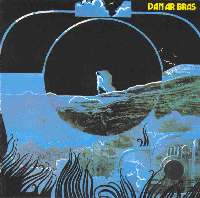 Finally, the long-awaited reissue of Dan Ar Bras' compelling first album. This is a very unique music, with wide-ranging influences, all served up in an inventive mix of moods and styles that pleases on many levels, in the same league as mid-period Jade Warrior, early Steve Tibbetts, Mike Oldfield, and others who tend to eschew convenient classification. The most evident influences on his style at this stage were Celtic and folk music, but he transcends the standard fare, obviating any of the simplistics through refined development and infusion of outside stimulus. There are moments of fiery guitar and powerful rhythms alternated with introspective atmospherics and idyllic piano, melodies carried by flutes and uilean pipes, wrapped around acoustic guitars and energetic synths. The lineup consists of Ar Bras (acoustic & electric guitars), Benoit Widemann (piano, keyboards), Dave Pegg (bass), Patrig Molard (flutes & pipes), Michel Santangeli (drums), and Marc Chantereau (percussion). This is a very unique album, full of fire, mood and surrealism, and also one which most progressive fans should enjoy. - Peter Thelen
Finally, the long-awaited reissue of Dan Ar Bras' compelling first album. This is a very unique music, with wide-ranging influences, all served up in an inventive mix of moods and styles that pleases on many levels, in the same league as mid-period Jade Warrior, early Steve Tibbetts, Mike Oldfield, and others who tend to eschew convenient classification. The most evident influences on his style at this stage were Celtic and folk music, but he transcends the standard fare, obviating any of the simplistics through refined development and infusion of outside stimulus. There are moments of fiery guitar and powerful rhythms alternated with introspective atmospherics and idyllic piano, melodies carried by flutes and uilean pipes, wrapped around acoustic guitars and energetic synths. The lineup consists of Ar Bras (acoustic & electric guitars), Benoit Widemann (piano, keyboards), Dave Pegg (bass), Patrig Molard (flutes & pipes), Michel Santangeli (drums), and Marc Chantereau (percussion). This is a very unique album, full of fire, mood and surrealism, and also one which most progressive fans should enjoy. - Peter Thelen
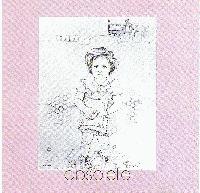 Aahhhh! Here's another Gong album no one seems to know about, as this is basically Gong plus poet/musician Dashiell Hedayat (otherwise known as Melmoth). Evidently the lyrical content (especially on the suite "Eh, Mushroom will you mush my room?") is drug related, it, and the back cover of the CD urges the listener to listen to the album "as stoned as impossible." Regardless, if you are an early Allen-period Gong fan, you are sure to love this one as it is CLASSIC 1971 Gong replete with Malherbe sax solos and killer gliss guitar. Hedayat proves to be a good guitarist (the album was too early for Hillage) and keyboard player, and the long 20 minute track here is an incredible space flight. This album was exteremely groundbreaking as parts of it resemble the Kosmische music label such as Sergius Golowin's "Lord Krishna Von Goloka" yet it was years before. The best comparison would be to Timothy Leary and Ash Ra Tempel's "Seven Up" with its delerious lyrics (the opener sounds very similar to the "Downtown" part of "Seven Up") as it is an incredible parallel to the album. What a great reissue; sounds good, and well worth the wait. - Mike Mclatchey
Aahhhh! Here's another Gong album no one seems to know about, as this is basically Gong plus poet/musician Dashiell Hedayat (otherwise known as Melmoth). Evidently the lyrical content (especially on the suite "Eh, Mushroom will you mush my room?") is drug related, it, and the back cover of the CD urges the listener to listen to the album "as stoned as impossible." Regardless, if you are an early Allen-period Gong fan, you are sure to love this one as it is CLASSIC 1971 Gong replete with Malherbe sax solos and killer gliss guitar. Hedayat proves to be a good guitarist (the album was too early for Hillage) and keyboard player, and the long 20 minute track here is an incredible space flight. This album was exteremely groundbreaking as parts of it resemble the Kosmische music label such as Sergius Golowin's "Lord Krishna Von Goloka" yet it was years before. The best comparison would be to Timothy Leary and Ash Ra Tempel's "Seven Up" with its delerious lyrics (the opener sounds very similar to the "Downtown" part of "Seven Up") as it is an incredible parallel to the album. What a great reissue; sounds good, and well worth the wait. - Mike Mclatchey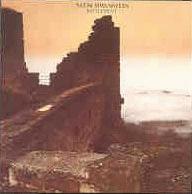 Neuschwanstein was a german band who's sole surviving artifact is their incredibly powerful album Battlement, originally released on the Racket label. The sound on the LP could be described as Planets period ELOY meets Moonmadness period CAMEL, with a touch of MACHIAVEL thrown in too. Lots of mellotrons, acoustic and electric guitars, unique keyboard work and plenty of interesting and colorful melodies, with a big pedal-bass sound. The vocalist sounds remarkably like Peter Gabriel; lyrics are all in english. The album has six long tracks, although musea has added one extra track for the CD reissue. The original mix was just a little on the bassy side, so with good intentions, Musea brought the band's guitar player in to remix the album. Unfortunately, most of the bass has now been mixed out, and the vocals have been brought further to the forefront, giving the album a whole new character sounding more like GENESIS than any of the aforementioned bands. This is one reissue I've been waiting for...I thought it would never happen given how obscure this album was, but I must admit I'm somewhat disappointed with the remix. Still, anyone not already familiar with the LP won't know what they're missing, for them this CD reissue should be acceptable. - Peter Thelen
Neuschwanstein was a german band who's sole surviving artifact is their incredibly powerful album Battlement, originally released on the Racket label. The sound on the LP could be described as Planets period ELOY meets Moonmadness period CAMEL, with a touch of MACHIAVEL thrown in too. Lots of mellotrons, acoustic and electric guitars, unique keyboard work and plenty of interesting and colorful melodies, with a big pedal-bass sound. The vocalist sounds remarkably like Peter Gabriel; lyrics are all in english. The album has six long tracks, although musea has added one extra track for the CD reissue. The original mix was just a little on the bassy side, so with good intentions, Musea brought the band's guitar player in to remix the album. Unfortunately, most of the bass has now been mixed out, and the vocals have been brought further to the forefront, giving the album a whole new character sounding more like GENESIS than any of the aforementioned bands. This is one reissue I've been waiting for...I thought it would never happen given how obscure this album was, but I must admit I'm somewhat disappointed with the remix. Still, anyone not already familiar with the LP won't know what they're missing, for them this CD reissue should be acceptable. - Peter Thelen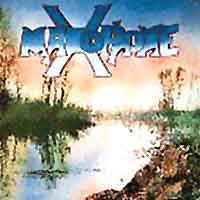 Ah yes, yet another great Italian band. The closest comparison that I can make is with Locanda delle Fate, but that doesn't quite describe Maxophone. While Locanda was a full, rich seven piece that composed some of the most beautiful multi-instrumental counterpoint I've ever heard, Maxophone uses a full, rich complex approach with a heavy guitar and some occasional harshness. Not only do they layer complex harmonies with ease, the point that pleased me the most when listening to this CD was the sudden, surprising changes of tempo and style. They switch from virtuouso classical piano melodies to mid twentieth century jazz between measures. Not only that, but with metalish guitar leads in some tracks, they move to gospel style vocal overdubs in others. This is a feast for those of you who like the 70's Italian bands or contradicting mood changes. Unfortunately, the CD was mastered off a record and loses it's excellent sound quality occasionally on the high-end parts. But don't let that stop you from enjoying this masterpiece. Even at the import price, it is well worth the money. Highly recommended. - Mike Borella
Ah yes, yet another great Italian band. The closest comparison that I can make is with Locanda delle Fate, but that doesn't quite describe Maxophone. While Locanda was a full, rich seven piece that composed some of the most beautiful multi-instrumental counterpoint I've ever heard, Maxophone uses a full, rich complex approach with a heavy guitar and some occasional harshness. Not only do they layer complex harmonies with ease, the point that pleased me the most when listening to this CD was the sudden, surprising changes of tempo and style. They switch from virtuouso classical piano melodies to mid twentieth century jazz between measures. Not only that, but with metalish guitar leads in some tracks, they move to gospel style vocal overdubs in others. This is a feast for those of you who like the 70's Italian bands or contradicting mood changes. Unfortunately, the CD was mastered off a record and loses it's excellent sound quality occasionally on the high-end parts. But don't let that stop you from enjoying this masterpiece. Even at the import price, it is well worth the money. Highly recommended. - Mike Borella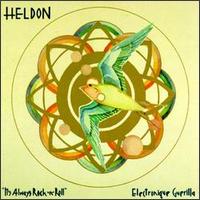 The Reissue of Heldon's first album is one that this writer has surely been anticipating for quite some time. What's even better is that Heldon's very elusive double 3rd album has been combined with it to make this excellent 2CD set. For the uninitiated, Heldon's sound could be described as a mixture of superb Frippian guitar and harsh agressive electronics, although there is no one formula used throughout, which gives these two albums such a unique character, alternating between styles within this electronic-industrial realm. Richard Pinhas pays regular homage to Fripp, without sounding particularly derivative of KC or anything else Fripp has done for that matter, as Heldon is infinitely more anarchic and hostile, yet at times the music lapses into an almost peaceful meditative mode. This is very unique music, and stands as strong today as it did when it was new. - Peter Thelen
The Reissue of Heldon's first album is one that this writer has surely been anticipating for quite some time. What's even better is that Heldon's very elusive double 3rd album has been combined with it to make this excellent 2CD set. For the uninitiated, Heldon's sound could be described as a mixture of superb Frippian guitar and harsh agressive electronics, although there is no one formula used throughout, which gives these two albums such a unique character, alternating between styles within this electronic-industrial realm. Richard Pinhas pays regular homage to Fripp, without sounding particularly derivative of KC or anything else Fripp has done for that matter, as Heldon is infinitely more anarchic and hostile, yet at times the music lapses into an almost peaceful meditative mode. This is very unique music, and stands as strong today as it did when it was new. - Peter Thelen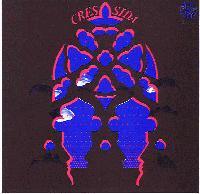 Cressida's second "Asylum" in my opinion is the best of the genre represented by Beggars' Opera, Spring, Fantasy, Fruupp, and many more. An amazingly elegant album, "Asylum" was a beautiful progressive rock album in that laid back English style with great room for instrumentals and a very pleasant vocalist. Both "Asylum" and their debut are very rare now (both were original Vertigo "Swirls") and it took a while for them to reissue this first one, but this was well worth the wait. While the songs are generally shorter, all of the ideas are there and in condensed form making this a great album of 70's progressive rock. If any of the above bands are to your liking, this one should be an essential purchase. - Mike Mclatchey
Cressida's second "Asylum" in my opinion is the best of the genre represented by Beggars' Opera, Spring, Fantasy, Fruupp, and many more. An amazingly elegant album, "Asylum" was a beautiful progressive rock album in that laid back English style with great room for instrumentals and a very pleasant vocalist. Both "Asylum" and their debut are very rare now (both were original Vertigo "Swirls") and it took a while for them to reissue this first one, but this was well worth the wait. While the songs are generally shorter, all of the ideas are there and in condensed form making this a great album of 70's progressive rock. If any of the above bands are to your liking, this one should be an essential purchase. - Mike Mclatchey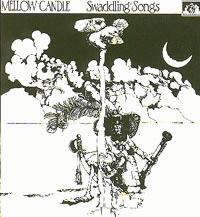 I think this one may have been repressed again, since I have seen many copies poke their heads out recently. This album in my opinion is the pinnacle of English progressive folk a la The Trees, Fairport Convention, and Spriguns. This band has two excellent lead vocalists; one of them, Clodagh Simmonds, went on to be one of Mike Oldfield's early vocalists (check out "Ommadawn" for a good example of her style). Both singers are simply outstanding, counterpointing each other (or themselves depending on the tracks) to incredible heights. There isn't a duff track on here, and is an ideal one to turn the non-progressive rock fan on to some new music as it is quite accessible. A flawless classic. - Mike Mclatchey
I think this one may have been repressed again, since I have seen many copies poke their heads out recently. This album in my opinion is the pinnacle of English progressive folk a la The Trees, Fairport Convention, and Spriguns. This band has two excellent lead vocalists; one of them, Clodagh Simmonds, went on to be one of Mike Oldfield's early vocalists (check out "Ommadawn" for a good example of her style). Both singers are simply outstanding, counterpointing each other (or themselves depending on the tracks) to incredible heights. There isn't a duff track on here, and is an ideal one to turn the non-progressive rock fan on to some new music as it is quite accessible. A flawless classic. - Mike Mclatchey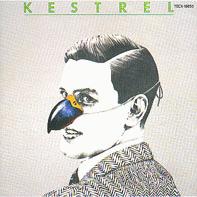 Here's another mid seventies British prog rock albums with mellotron and sounding like Fruupp, Spring, Fantasy and all those I mentioned in the Cressida review. Here is where the music gets a bit too commercial for my tastes, although there are some mind- numbing mellotron blasts on here that any 'tron fan can appreciate. Some good guitar work also grace the album, but sometimes the melodies are a bit too catchy for my liking. Many of you probably would dig this, but it's getting hard to find. - Mike Mclatchey
Here's another mid seventies British prog rock albums with mellotron and sounding like Fruupp, Spring, Fantasy and all those I mentioned in the Cressida review. Here is where the music gets a bit too commercial for my tastes, although there are some mind- numbing mellotron blasts on here that any 'tron fan can appreciate. Some good guitar work also grace the album, but sometimes the melodies are a bit too catchy for my liking. Many of you probably would dig this, but it's getting hard to find. - Mike Mclatchey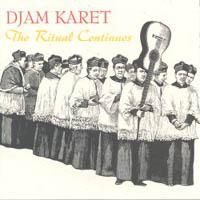 Imagine a sound with the force and power of mid-period King Crimson, the fluidity and spaciness of Pink Floyd, and the percussive power of Peter Gabriel's "Security". Throw into that mix a generous helping of the new Industrial Rock with plenty of improvisation, and you have the sound of Djam Karet: progressive, snarly, full of fire and 100% instrumental. One of the most welcome reissues of the year is this, their 1987 classic, heretofore only available on cassette (although it did appear briefly on LP in Brazil). This showcases the band's live show at that period in time, and successfully integrates the wide diversity in their material, from the harder rocking numbers like 'Technology & Industry', to the more ethereal spacy cuts like 'The Black River'. At times both ends of the spectrum fuse perfectly, exemplified by the outstanding title track, or 'Shaman's Descent'. One of the more ethnic/industrial oriented tracks from the origanal cassette (A City Of Two Tales) does not appear here, but instead has been replaced by two tracks from their 1982 cassette "Kafka's Breakfast", and 'A Quiet Place' has been re-recorded, extended, and re-titled 'Falling Down 1993'. For anyone not yet familiar with DK, this is as good a place as any to start. - Peter Thelen
Imagine a sound with the force and power of mid-period King Crimson, the fluidity and spaciness of Pink Floyd, and the percussive power of Peter Gabriel's "Security". Throw into that mix a generous helping of the new Industrial Rock with plenty of improvisation, and you have the sound of Djam Karet: progressive, snarly, full of fire and 100% instrumental. One of the most welcome reissues of the year is this, their 1987 classic, heretofore only available on cassette (although it did appear briefly on LP in Brazil). This showcases the band's live show at that period in time, and successfully integrates the wide diversity in their material, from the harder rocking numbers like 'Technology & Industry', to the more ethereal spacy cuts like 'The Black River'. At times both ends of the spectrum fuse perfectly, exemplified by the outstanding title track, or 'Shaman's Descent'. One of the more ethnic/industrial oriented tracks from the origanal cassette (A City Of Two Tales) does not appear here, but instead has been replaced by two tracks from their 1982 cassette "Kafka's Breakfast", and 'A Quiet Place' has been re-recorded, extended, and re-titled 'Falling Down 1993'. For anyone not yet familiar with DK, this is as good a place as any to start. - Peter Thelen Considered by most a classic, this album was very recently put out by the Laser's Edge. One of the most unique and interesting Krautrock releases of the seventies, "A Meditation Mass" is a four part suite. First off, one must realize that you can't listen to Yatha Sidhra the same way that you listen to most progressive music. You can't listen to each instrument closely and try to piece together the music. This is only a three-piece, based around drums, guitar, bass, and a guest on flute. The sound isn't full. Instead of listening for compositional complexities, just relax and let the music carry you away. It will. Part 1 of the suite starts slowly with flanged guitar picking through chords, overlaid flute, and melodic percussion. My hat is off to drummer Klaus Fichter for his use of the drums as a lead instrument. The music gradually picks up in intensity, until it segues into Part 2. Through, a very "cosmic" feel is presented. I can't help but think this would make a great soundtrack to a fantasy-styled movie, even though I hate fantasy movies! Part 3 is the most upbeat, with a walking bass line complemented by non-stop guitar soloing and drum leads. Part 4 reverts to the themes and style of part one, tying this work together quite well. A nice bonus is that all the tracks segue, so its like listening to one 40 minute piece. Comparisons won't do Yatha Sidhra justice because they are original. But if I had to pick out a few, they would be: Popol Vuh, Laurent Thibault, and Kebnekaise. A great release. - Mike Borella
Considered by most a classic, this album was very recently put out by the Laser's Edge. One of the most unique and interesting Krautrock releases of the seventies, "A Meditation Mass" is a four part suite. First off, one must realize that you can't listen to Yatha Sidhra the same way that you listen to most progressive music. You can't listen to each instrument closely and try to piece together the music. This is only a three-piece, based around drums, guitar, bass, and a guest on flute. The sound isn't full. Instead of listening for compositional complexities, just relax and let the music carry you away. It will. Part 1 of the suite starts slowly with flanged guitar picking through chords, overlaid flute, and melodic percussion. My hat is off to drummer Klaus Fichter for his use of the drums as a lead instrument. The music gradually picks up in intensity, until it segues into Part 2. Through, a very "cosmic" feel is presented. I can't help but think this would make a great soundtrack to a fantasy-styled movie, even though I hate fantasy movies! Part 3 is the most upbeat, with a walking bass line complemented by non-stop guitar soloing and drum leads. Part 4 reverts to the themes and style of part one, tying this work together quite well. A nice bonus is that all the tracks segue, so its like listening to one 40 minute piece. Comparisons won't do Yatha Sidhra justice because they are original. But if I had to pick out a few, they would be: Popol Vuh, Laurent Thibault, and Kebnekaise. A great release. - Mike Borella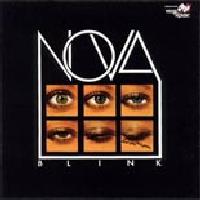 A logical precursor to Brand X, Nova is an Italian fusion band that features the mind-numbing bass and drum interplay of Brand X, but follows through with guitar, sax and vocals as well. Vocals are in English, and unlike many Italian bands that use English vocals, the singing does not detract from the overall quality of the music. After listening a few times, I realized that Nova has four lead instruments: The guitars, sax, bass and drums all play lead-styled lines, at the same time, for the most part. The overall product is a very complex jam with occasional vocals. Any fan of Brand X, Ossana or Area may find this interesting listening. I find it fantastic - yet another long lost Italian classic. This is their first album. They recorded three more, and I've heard that they got "rockier" as time went on. Whatever. "Blink" stands on its own. Highly recommended. - Mike Borella
A logical precursor to Brand X, Nova is an Italian fusion band that features the mind-numbing bass and drum interplay of Brand X, but follows through with guitar, sax and vocals as well. Vocals are in English, and unlike many Italian bands that use English vocals, the singing does not detract from the overall quality of the music. After listening a few times, I realized that Nova has four lead instruments: The guitars, sax, bass and drums all play lead-styled lines, at the same time, for the most part. The overall product is a very complex jam with occasional vocals. Any fan of Brand X, Ossana or Area may find this interesting listening. I find it fantastic - yet another long lost Italian classic. This is their first album. They recorded three more, and I've heard that they got "rockier" as time went on. Whatever. "Blink" stands on its own. Highly recommended. - Mike Borella Finally, the long-awaited reissue of Dan Ar Bras' compelling first album. This is a very unique music, with wide-ranging influences, all served up in an inventive mix of moods and styles that pleases on many levels, in the same league as mid-period Jade Warrior, early Steve Tibbetts, Mike Oldfield, and others who tend to eschew convenient classification. The most evident influences on his style at this stage were Celtic and folk music, but he transcends the standard fare, obviating any of the simplistics through refined development and infusion of outside stimulus. There are moments of fiery guitar and powerful rhythms alternated with introspective atmospherics and idyllic piano, melodies carried by flutes and uilean pipes, wrapped around acoustic guitars and energetic synths. The lineup consists of Ar Bras (acoustic & electric guitars), Benoit Widemann (piano, keyboards), Dave Pegg (bass), Patrig Molard (flutes & pipes), Michel Santangeli (drums), and Marc Chantereau (percussion). This is a very unique album, full of fire, mood and surrealism, and also one which most progressive fans should enjoy. - Peter Thelen
Finally, the long-awaited reissue of Dan Ar Bras' compelling first album. This is a very unique music, with wide-ranging influences, all served up in an inventive mix of moods and styles that pleases on many levels, in the same league as mid-period Jade Warrior, early Steve Tibbetts, Mike Oldfield, and others who tend to eschew convenient classification. The most evident influences on his style at this stage were Celtic and folk music, but he transcends the standard fare, obviating any of the simplistics through refined development and infusion of outside stimulus. There are moments of fiery guitar and powerful rhythms alternated with introspective atmospherics and idyllic piano, melodies carried by flutes and uilean pipes, wrapped around acoustic guitars and energetic synths. The lineup consists of Ar Bras (acoustic & electric guitars), Benoit Widemann (piano, keyboards), Dave Pegg (bass), Patrig Molard (flutes & pipes), Michel Santangeli (drums), and Marc Chantereau (percussion). This is a very unique album, full of fire, mood and surrealism, and also one which most progressive fans should enjoy. - Peter Thelen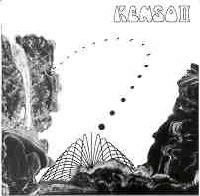 Another welcome reissue, prices for original LPs of Kenso's extremely rare first and second albums have been soaring skyward in the last few years, beyond the reach of the average progressive music fan. So at last we have the entire second album, along with the better half of the tracks on the first, all on one compact disc. Their sound in the early years could be likened to a Japanese answer to Happy-The-Man meets Mahavishnu Orchestra. The dominant lead instrument is the flute, backed up by a powerful guitar and keyboard presence, and a very agile rhythm section. The strong influence of Japanese traditional can be heard throughout this bold instrumental set, but no more so than on "Flute in the Dark Shadow" (#4) and the three tracks culled from the first album. Throughout, the compositions are brilliant and incredibly sophisticated, and the performance is spirited...of course this is no news to anyone already familiar with Kenso's more recent output, for whom this one is a must-have. For anyone not familiar with Kenso, this is as good a place as any to start. My highest recommendation.- Peter Thelen
Another welcome reissue, prices for original LPs of Kenso's extremely rare first and second albums have been soaring skyward in the last few years, beyond the reach of the average progressive music fan. So at last we have the entire second album, along with the better half of the tracks on the first, all on one compact disc. Their sound in the early years could be likened to a Japanese answer to Happy-The-Man meets Mahavishnu Orchestra. The dominant lead instrument is the flute, backed up by a powerful guitar and keyboard presence, and a very agile rhythm section. The strong influence of Japanese traditional can be heard throughout this bold instrumental set, but no more so than on "Flute in the Dark Shadow" (#4) and the three tracks culled from the first album. Throughout, the compositions are brilliant and incredibly sophisticated, and the performance is spirited...of course this is no news to anyone already familiar with Kenso's more recent output, for whom this one is a must-have. For anyone not familiar with Kenso, this is as good a place as any to start. My highest recommendation.- Peter Thelen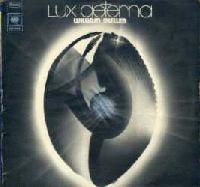 Lux Aeterna is one of the few successful early examples of the fusion of rock music and orchestra. Masterminded by William Sheller, who at the time was a successful French singer, he composed and recorded the entire score, complete with lush choruses and and a full blown symphony orchestra, and only a skeletal rock presence of guitar, organ, bass and drums. At certain points a blistering lead guitar might come screaming out of the symphonic blanket just to remind the listener that this is a rock album after all. There is occasional narration, along with some reminders of the times (voices jumping back and forth between left and right speakers, mysterious psychedelic sound effects); For those who need comparisons, I am reminded of Pink Floyd's "Atom Heart Mother" at times, also of Clearlight Symphony, but overall this is a remarkably unique project. - Peter Thelen
Lux Aeterna is one of the few successful early examples of the fusion of rock music and orchestra. Masterminded by William Sheller, who at the time was a successful French singer, he composed and recorded the entire score, complete with lush choruses and and a full blown symphony orchestra, and only a skeletal rock presence of guitar, organ, bass and drums. At certain points a blistering lead guitar might come screaming out of the symphonic blanket just to remind the listener that this is a rock album after all. There is occasional narration, along with some reminders of the times (voices jumping back and forth between left and right speakers, mysterious psychedelic sound effects); For those who need comparisons, I am reminded of Pink Floyd's "Atom Heart Mother" at times, also of Clearlight Symphony, but overall this is a remarkably unique project. - Peter Thelen